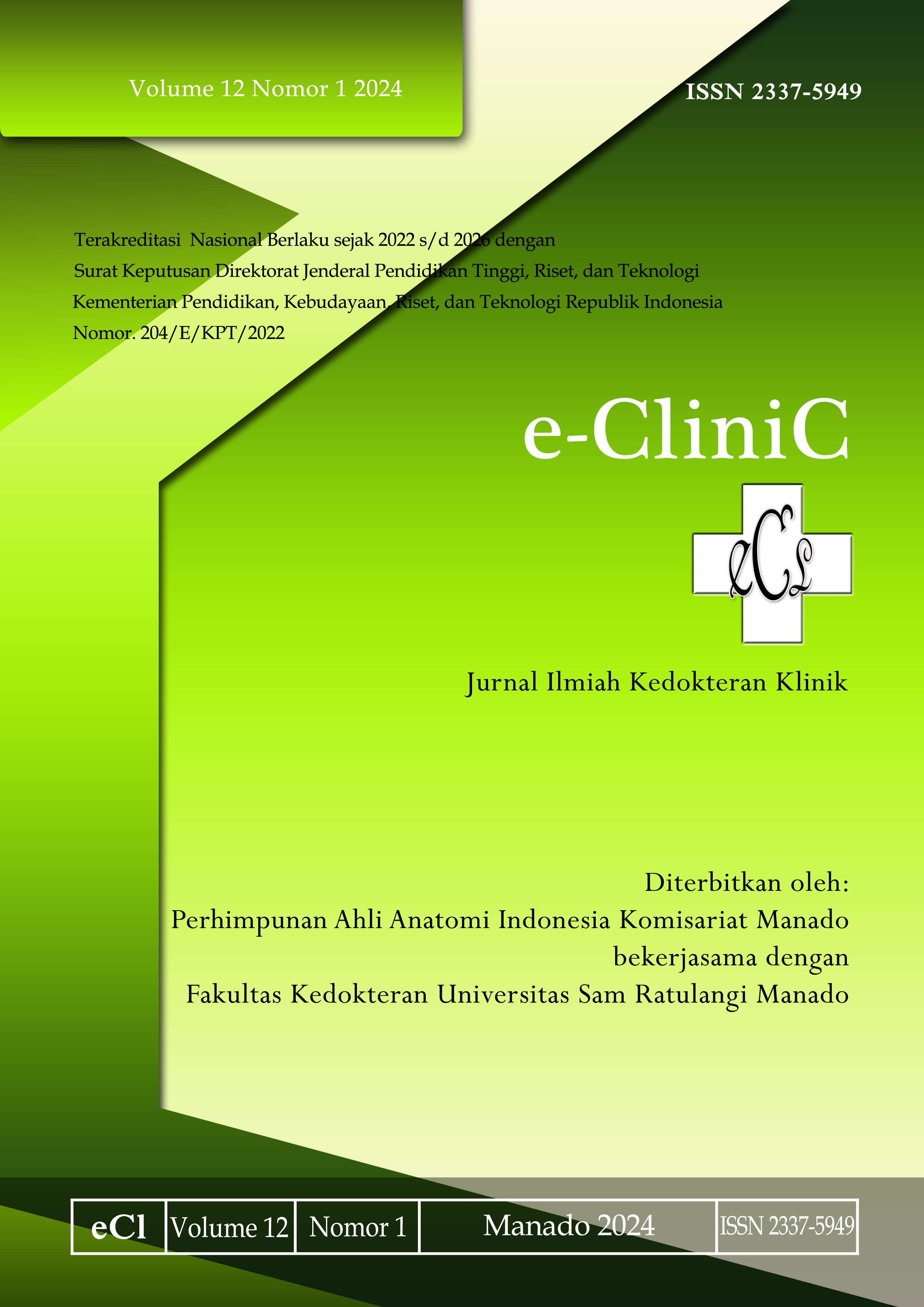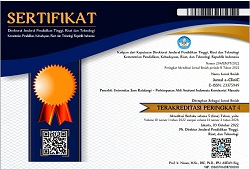Analisis Pelaksanaan Program Pencegahan dan Pengendalian Infeksi Nosokomial di Rumah Sakit Umum Daerah Anugerah Tomohon
DOI:
https://doi.org/10.35790/ecl.v12i1.45864Abstract
Abstract: Infection prevention and control (IPC) is an effort to prevent and minimize the occurrence of infections in patients, staff, visitors, and the community around health care facilities. The IPC unit in a hospital aims to improve the quality of health services, so as to protect the patients. community, and health workers from infectious diseases related to the health services provided. This study aimed to explore in depth the implementation of IPC in improving the quality of services at RSUD Anugerah Tomohon. This was a qualitative study using five informants. The results showed that there was still no commitment of all IPC members and all parties involved in the implementation of the IPC, therefore, the implementation of the IPC program was not in accordance with the SOP. Hospital management had provided facilities and infrastructures supporting the IPC but there were often vacancies/damages. Some alternative solutions included holding meetings with hospital management to provide support for the IPC team, funding follow-up training and seminars, taking an interpersonal approach, and providing education and motivation to health workers. In conclusion, the IPC program has generally been running well at RSUD Anugerah even though there are still obstacles faced by the IPC team. The hospital management has also provided facilities and infrastructure to support the implementation of the IPC program even though they have not met the standards.
Keywords: infection prevention and control; hospital management; quality of health services
Abstrak: Pencegahan dan pengendalian infeksi (PPI) merupakan upaya untuk mencegah dan meminimalkan terjadinya infeksi pada pasien, petugas, pengunjung, dan masyarakat sekitar fasilitas pelayanan kesehatan. Unit PPI Rumah Sakit bertujuan untuk meningkatkan kualitas pelayanan kesehatan sehingga dapat melindungi pasien, masyarakat, dan sumber daya kesehatan dari bahaya penyakit infeksi terkait pelayanan kesehatan yang diberikan. Penelitian ini bertujuan untuk mengeksplorasi secara mendalam pelaksanaan PPI dalam meningkatkan mutu pelayanan di RSUD Anugerah Tomohon dengan menggunakan metode kualitatif dan sampel sebanyak lima informan. Hasil penelitian menunjukkan belum adanya komitmen dari seluruh anggota PPI dan semua pihak yang terlibat dalam pelaksanaan PPI sehingga pelaksanaan program PPI belum sesuai dengan SOP. Manajemen Rumah Sakit telah menyediakan sarana dan prasarana yang mendukung pelaksanaan program PPI namun sering terjadi kekosongan/rusak. Beberapa alternatif pemecahan masalah antara lain mengadakan pertemuan dengan manajemen rumah sakit untuk memberikan dukungan bagi tim PPI, mendanai pelatihan lanjutan dan seminar, melakukan pendekatan interpersonal, serta memberikan edukasi dan motivasi kepada petugas kesehatan. Simpulan penelitian ini ialah proses pelaksanaan PPI umumnya sudah berjalan baik di RSUD Anugerah walaupun masih terdapat kendala yang dihadapi oleh tim PPI. Pihak manajemen Rumah Sakit juga telah menyediakan sarana dan prasarana pendukung pelaksanaan program PPI walaupun belum memenuhi standar.
Kata kunci: pencegahan dan pengendalian infeksi; manajemen rumah sakit; mutu pelayanan
References
Undang-Undang nomor 44 tahun 2009 tentang Rumah Sakit Indonesia. Available from: https://www.scribd.com/doc/297582788/UU-NO-44-TAHUN-2009-TENTANG-RUMAH-pdf
Standar Nasional Akreditasi Rumah Sakit Edisi 1. Available from: http:// snars.web.id/2018/donwload/ SNARS1.pdf.
Kemenkes RI. Penggunaan Antibiotik Bijak dan Rasional Kurangi Beban Penyakit Infeksi. Jakarta: Kementrian Kesehatan Republik Indonesia; 2015. Available from: https://kemkes.go.id/eng/rilis-kesehatan/penggunaan-antibiotik-bijak-dan-rasional-kurangi-beban-penyakit-infeksi.
Wigglesworth N. Journal watch. Jurnal of Infection Prevention. 2014;15(1):41. Available from: https: //doi.org/10.1177/1757177413515035.
Darmadi. Infeksi Nosokomial Problematika dan Pengendaliannya. Jakarta: Salemba Medika; 2008.
Permenkes No 8 Tahun 2015. Program Pengendalian Resistensi Antimikroba di Rumah Sakit. Jakarta; 2015. Available from: https://peraturan.go.id/id/permenkes-no-8-tahun-2015.
Sapardi, Machmud R, Gusty RP. Analisis pelaksanaan manajemen pencegahan dan pengendalian health care associated infections di RSI Ibnusina. Jurnal Endurance 2018;3(2):358. Available from: https://doi.org/10.22216/jen.v3i2.1230.
Ningsih EV. Hubungan antara tingkat pengetahuan dan motivasi perawat dengan perilaku pencegahan infeksi nosokomial di Rumah Sakit Umum Daerah Sukoharjo [Skripsi]. Surakarta: Universitas Muhammadiyah Surakarta; 2013.
RSUD Pasaman Barat. Laporan Hasil Kerja Tim PPI dan Dokumen Komite PPI RS tentang Rekomendasi KARS. Pasaman Barat: RSUD Pasaman Barat; 2017.
Peraturan Menteri Kesehatan Republik Indonesia No 27 Tahun 2017 tentang pedoman pencegahan dan pengendalian infeksi di fasilitas layanan kesehatan. Jakarta; 2017. Available from: https://www academia.edu/37731715/Permenkes_nomor_27_tahun_2017_tentang_Pedoman_PPI_di_Fasyankes
Nelwan RM, Mandagi CKF, Boky H. Pelaksanaan pencegahan dan pengendalian infeksi di RSUP Ratok Buyat tahun 2017. Jurnal Kesehatan Masyarakat. 2017;4(3):1-10.
Kementerian Kesehatan, PERDALIN RSPI Prof. Dr. Sulianti Saroso. Pedoman Manajerial Pencegahan dan Pengendalian Infeksi di Rumah Sakit dan Fasilitas Pelayanan Kesehatan Lainnya. Jakarta: Kementerian Kesehatan; 2011.
Downloads
Published
How to Cite
Issue
Section
License
Copyright (c) 2023 Irene Pandeiroot, Nurdjanah J. Niode, Novie H. Rampengan

This work is licensed under a Creative Commons Attribution-NonCommercial 4.0 International License.
COPYRIGHT
Authors who publish with this journal agree to the following terms:
Authors hold their copyright and grant this journal the privilege of first publication, with the work simultaneously licensed under a Creative Commons Attribution License that permits others to impart the work with an acknowledgment of the work's origin and initial publication by this journal.
Authors can enter into separate or additional contractual arrangements for the non-exclusive distribution of the journal's published version of the work (for example, post it to an institutional repository or publish it in a book), with an acknowledgment of its underlying publication in this journal.
Authors are permitted and encouraged to post their work online (for example, in institutional repositories or on their website) as it can lead to productive exchanges, as well as earlier and greater citation of the published work (See The Effect of Open Access).







